Globalisation and Development Cooperation
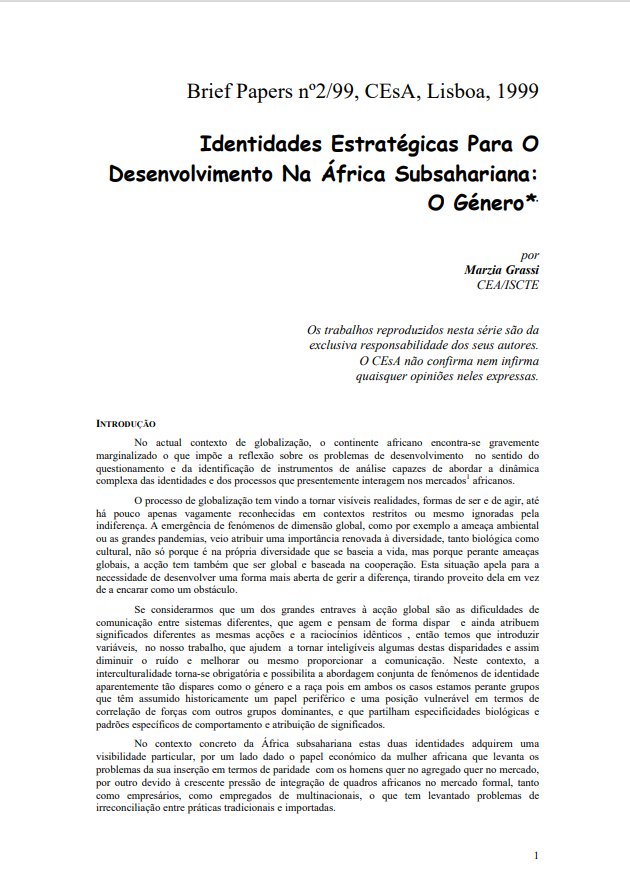
Brief Paper 3/1999: Identidades Estratégicas para o Desenvolvimento na África Subsahariana: O género
Abstract:
In the current context of globalisation, the African continent is seriously marginalised, which makes it necessary to reflect on development problems in order to question and identify analytical instruments capable of dealing with the complex dynamics of identities and processes that are currently interacting in African I-markets. The process of globalisation has made visible realities, ways of being and acting which until recently were only vaguely recognised in restricted contexts or even ignored through indifference. The emergence of phenomena with a global dimension, such as environmental threats or major pandemics, has given renewed importance to diversity, both biological and cultural, not only because diversity itself is the basis of life, but because in the face of global threats, action must also be global and based on cooperation. This situation calls for the need to develop a more open way of managing difference, taking advantage of it rather than seeing it as an obstacle. If we consider that one of the major barriers to global action are the difficulties of communication between different systems, which act and think differently and even assign different meanings to the same actions and identical reasoning, then we have to introduce variables in our work that help to make some of these disparities intelligible and thus reduce the noise and improve or even provide communication. In this context, interculturality becomes compulsory and enables a joint approach to identity phenomena apparently as disparate as gender and race, because in both cases we are dealing with groups that have historically assumed a peripheral role and a vulnerable position in terms of the correlation of forces with other dominant groups, sharing biological specificities and specific patterns of behaviour and meaning attribution. Identidades Estratégicas para o Desenvolvimento na África Subsahariana: O género (Strategic identities for development in Sub-Saharan Africa: gender) was presented at the 1st Portugal – China Congress organised by the University of Trás-os-Montes e Alto Douro in Vila Real, 19-23 April 1999.
Quotation:
Grassi, Marzia. 1999. “Identidades estratégicas para o desenvolvimento na África Subsahariana : o género”. Instituto Superior de Economia e Gestão – CEsA Brief papers nº 3-1999.
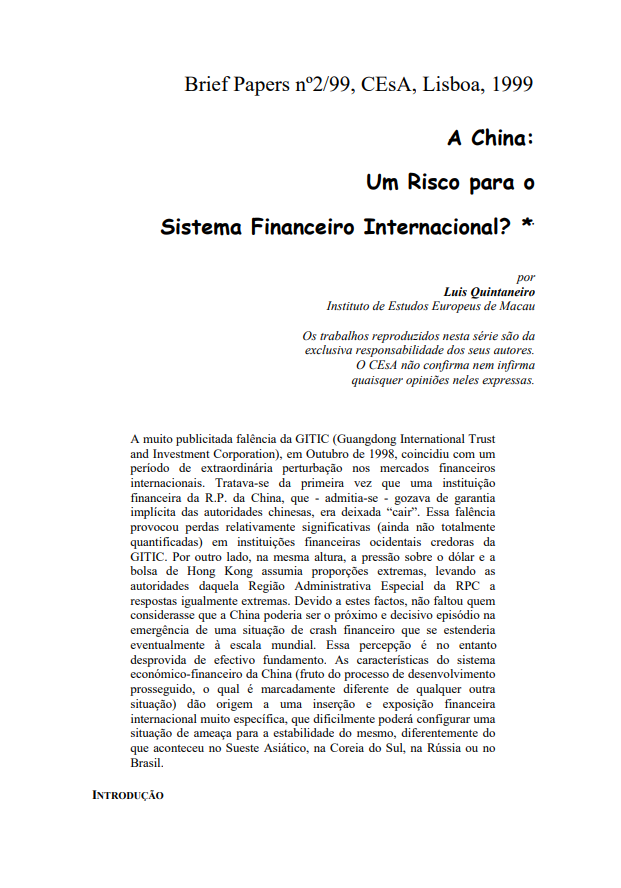
Brief Paper 2/1999: A China: Um risco para o sistema financeiro internacional?
Abstract:
The much publicized bankruptcy of G1T1C (Guangdong International Trust and Investment Corporation) in October 1998 coincided with a period of extraordinary turmoil in international financial markets. It was the first time that a financial institution in the R.P. of China, which – it was admitted – enjoyed an implicit guarantee from the Chinese authorities, was allowed to “fall”. This bankruptcy caused relatively significant losses (not yet fully quantified) in Western financial institutions creditors of GITIC. On the other hand, at the same time, the pressure on the dollar and the Hong Kong stock market was taking on extreme proportions, leading the authorities of that PRC Special Administrative Region to similarly extreme responses. Due to these facts, there was no lack of those who considered that China could be the next and decisive episode in the emergence of a situation of financial crash that would eventually extend to the world scale. This perception is, however, devoid of any real foundation. The characteristics of China’s economic and financial system (the result of the development process pursued, which is markedly different from any other situation) give rise to a very specific international financial insertion and exposure, which can hardly constitute a threat to stability of the same, unlike what happened in Southeast Asia, South Korea, Russia or Brazil. China: Um Risco para o Sistema Financeiro Internacional? was presented at the 1st Portugal – China Congress organised by the University of Trás-os-Montes e Alto Douro in Vila Real, 19-23 April 1999.
Quotation:
Quintaneiro, Luís. 1999. China: Um Risco para o Sistema Financeiro Internacional? Instituto Superior de Economia e Gestão – CEsA Brief papers nº 2-1999
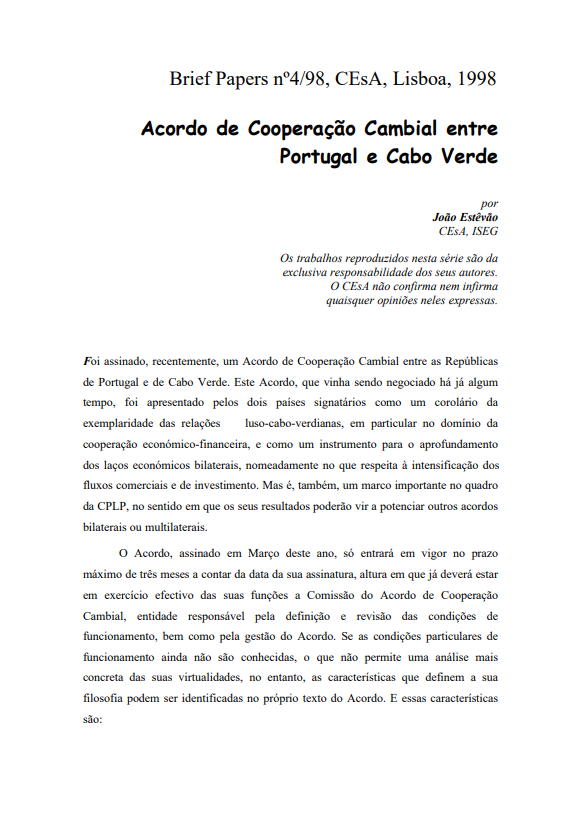
Brief Paper 4/1998: Acordo de Cooperação Cambial entre Portugal e Cabo Verde
Abstract:
An Exchange Cooperation Agreement was recently signed between the Republics of Portugal and Cape Verde. This agreement, which had been under negotiation for some time, was presented by the two signatory countries as a corollary to the exemplary nature of Luso-Cape Verde relations, especially in the area of economic and financial cooperation, and as an instrument for strengthening bilateral economic ties, especially as regards the intensification of trade and investment flows. But it is also an important milestone in the framework of the CPLP, in the sense that its results may come to enhance other bilateral or multilateral agreements. The Agreement, signed in March this year, will only come into force within a maximum of three months from the date it is signed, by which time the Exchange Cooperation Agreement Commission, the entity responsible for defining and reviewing the operating conditions, as well as for managing the Agreement, should already be performing its duties. If the specific operating conditions are not yet known, which does not allow a more concrete analysis of its virtualities, however, the characteristics which define its philosophy may be identified in the text of the Agreement itself. A summary of Acordo de cooperação cambial entre Portugal e Cabo Verde (Agreement on Exchange Rate Co-operation between Portugal and Cape Verde), entitled Moeda une Portugal e Cabo Verde (Currency unites Portugal and Cape Verde), was published in Informação Lusófona (UCCLA), no. 6, April 1998, p. 2.
Quotation:
Estêvão, João. 1998. “Acordo de cooperação cambial entre Portugal e Cabo Verde”. Instituto Superior de Economia e Gestão – CEsA Brief papers nº 4-1998.

Brief Paper 1/1996: As Fronteiras em África: Contributo para uma reflexão crítica
Abstract:
The role played by political borders in Africa (predominantly inherited from the colonial period) has merited some critical reflections by some authors, both in terms of their role in the construction of the new states and in terms of their impact and consequences in the lives of the populations of the cross-border regions. In As fronteiras em África: contributo para uma reflexão crítica we have two texts, by Daniel Bach and Emmanuel Grégoire, from which short extracts are presented. First, however, a necessarily succinct exposition of their respective theses: For Daniel Bach, Regionalisation tends to be done not by dismantling the barriers that constitute borders, but by taking advantage of the business opportunities originated by these very borders. A second thesis of Bach is that the Structural Adjustment Programmes, by reducing fiscal or customs differences between states, tend to transfer to the external borders of the continent those same business opportunities or the search for them…) and thus accelerate the criminalisation of flows. A first question arises here: the nature of this “regionalisation” of which Daniel Bach speaks, and the text of this author which we quoted above is as follows: “Transstate flows and circuits exercise functions of social regulation and accumulation which are vital for populations faced with the disintegration of official circuits and the regression of the territorial framework of the state”. As for Grégoire, the text offered for our reflection here is taken from a historical and anthropological account of a phenomenon which at first sight is predominantly economic and has the suggestive title: “The Smuggling Paths “Far from being an obstacle to trade, the border which has separated the Hausa country for over twenty years is, on the contrary, a stimulus… On an economic level, its dynamic effects outweigh the negative effects…”.
Quotation:
Statter, Guilherme da Fonseca. 1996. “As fronteiras em África: contributo para uma reflexão crítica”. Instituto Superior de Economia e Gestão – CEsA Brief papers nº 1-1996.
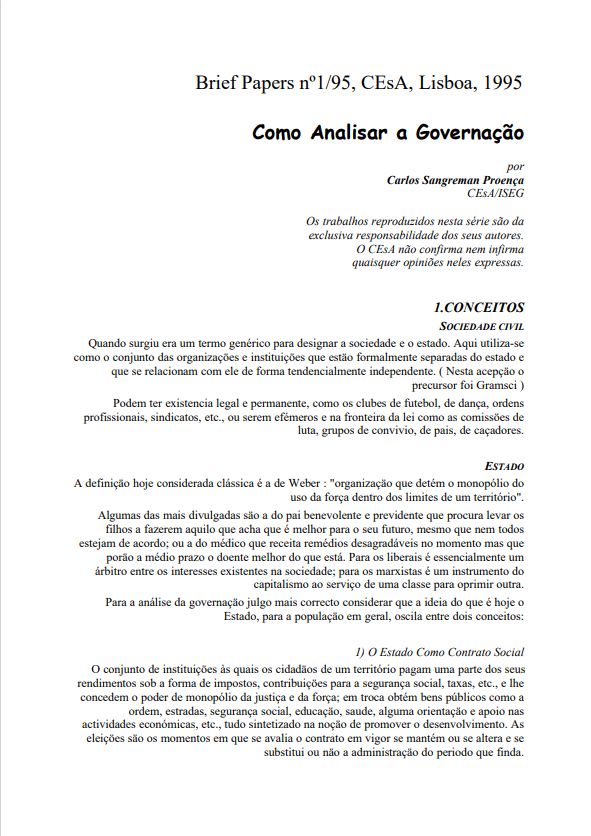
Brief Paper 1/1995: Como Analisar a Governação
Abstract:
Although the issue of Como analisar a governação is still at the beginning of the discussion in the scientific community, a set of criteria seems to be emerging, little by little, as consensual. For some of them, there is still the problem of which indicators to use, how to quantify them or what normative scale to define in order to assess them, and there are few practical applications of analysis to specific countries. And research needs to be done. The criteria for evaluating governance can be summarised in five groups, which can be applied to the notion of the Contract State and a softer version of the Arena State, where the interest groups that hold power assume the position of the medieval lord with the obligation to look after the welfare of the people, but never forgetting that his family and those close to him come first. Nobody is fully represented by another, and the further away that other is culturally and physically, the weaker the link. Thus, the population that feels that the Members of Parliament in Lisbon or Strasbourg are distant from its problems, tends socially to behave in defence, attack or seek alternatives, always with little credit for those who are far away and do not know each other.
Quotation:
Sangreman, Carlos. 1995. “Como analisar a governação”. Instituto Superior de Economia e Gestão – CEsA Brief Papers nº 1-1995.
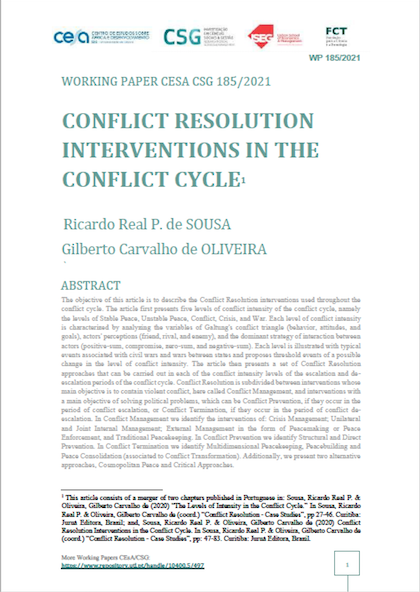
Working Paper 185/2021: Conflict Resolution Interventions in the Conflict Cycle
Abstract:
The objective of this article is to describe the Conflict Resolution interventions used throughout the conflict cycle. The article first presents five levels of conflict intensity of the conflict cycle, namely the levels of Stable Peace, Unstable Peace, Conflict, Crisis, and War. Each level of conflict intensity is characterized by analyzing the variables of Galtung’s conflict triangle (behavior, attitudes, and goals), actors’ perceptions (friend, rival, and enemy), and the dominant strategy of interaction between actors (positive-sum, compromise, zero-sum, and negative-sum). Each level is illustrated with typical events associated with civil wars and wars between states and proposes threshold events of a possible change in the level of conflict intensity. The article then presents a set of Conflict Resolution approaches that can be carried out in each of the conflict intensity levels of the escalation and de escalation periods of the conflict cycle. Conflict Resolution is subdivided between interventions whose main objective is to contain violent conflict, here called Conflict Management, and interventions with a main objective of solving political problems, which can be Conflict Prevention, if they occur in the period of conflict escalation, or Conflict Termination, if they occur in the period of conflict de escalation. In Conflict Management we identify the interventions of: Crisis Management; Unilateral and Joint Internal Management; External Management in the form of Peacemaking or Peace Enforcement, and Traditional Peacekeeping. In Conflict Prevention we identify Structural and Direct Prevention. In Conflict Termination we identify Multidimensional Peacekeeping, Peacebuilding and Peace Consolidation (associated to Conflict Transformation). Additionally, we present two alternative approaches, Cosmopolitan Peace and Critical Approaches.
Quotation:
Sousa, Ricardo Real P. de e Gilberto Carvalho de Oliveira (2021). “Conflict resolution interventions in the conflict cycle”. Instituto Superior de Economia e Gestão – CEsA/ CSG Documentos de Trabalho nº 185/2021.
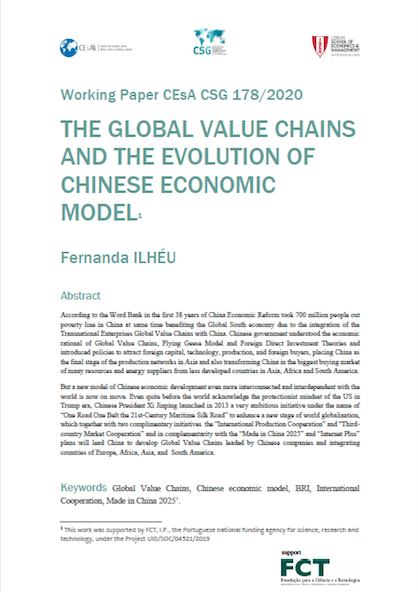
Working Paper 178/2020: The Global Value Chains and the Evolution of Chinese Economic Model
Abstract:
According to the Word Bank in the first 38 years of China Economic Reform took 700 million people out poverty line in China at same time benefiting the Global South economy due to the integration of the Transnational Enterprises Global Value Chains with China. Chinese government understood the economic rational of Global Value Chains, Flying Geese Model and Foreign Direct Investment Theories and introduced policies to attract foreign capital, technology, production, and foreign buyers, placing China as the final stage of the production networks in Asia and also transforming China in the biggest buying market of many resources and energy suppliers from less developed countries in Asia, Africa and South America. But a new model of Chinese economic development even more interconnected and interdependent with the world is now on move. Even quite before the world acknowledge the protectionist mindset of the US in Trump era, Chinese President Xi Jinping launched in 2013 a very ambitious initiative under the name of “One Road One Belt the 21st-Century Maritime Silk Road” to enhance a new stage of world globalization, which together with two complimentary initiatives the “International Production Cooperation” and “Third-country Market Cooperation” and in complementarity with the “Made in China 2025” and “Internet Plus” plans will lead China to develop Global Value Chains leaded by Chinese companies and integrating countries of Europe, Africa, Asia, and South America, studied in The Global Value Chains and the Evolution of Chinese Economic Model.
Quotation:
Ilhéu, Fernanda (2020). “The global value chains and the evolution of chinese economic model”. Instituto Superior de Economia e Gestão – CEsA/ CSG Documentos de Trabalho nº 178/2020.
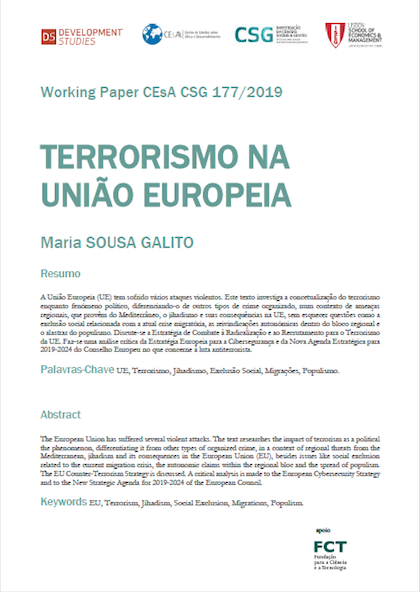
Working Paper 177/2019: Terrorismo na União Europeia
Abstract:
The European Union (EU) has suffered several violent attacks. Terrorismo na União Europeia investigates the conceptualisation of terrorism as a political phenomenon, differentiating it from other types of organised crime, in a context of regional threats, coming from the Mediterranean, jihadism and its consequences in the EU, without forgetting issues such as social exclusion related to the current migration crisis, autonomous claims within the regional bloc and the spread of populism. The EU Strategy for Combating Radicalisation and Recruitment to Terrorism is discussed. A critical analysis is made of the European Cybersecurity Strategy and the European Council’s New Strategic Agenda for 2019-2024 with regard to counter-terrorism. The idea is to confront legislative measures and to review precedents, within the framework of the Security Union and the Defence Union. The critical analysis of EU action is made on the basis of the challenges identified by the European Commission for the Community future, considering the Strategic Agenda 2019/2024, in a disruptive environment, in which the Community institutions have tried to be effective or even innovative and forerunners in terms of policy change.
Quotation:
Galito, Maria Sousa (2019). “Terrorismo na União Europeia”. Instituto Superior de Economia e Gestão – CEsA/CSG Documentos de Trabalho nº 177-2019.
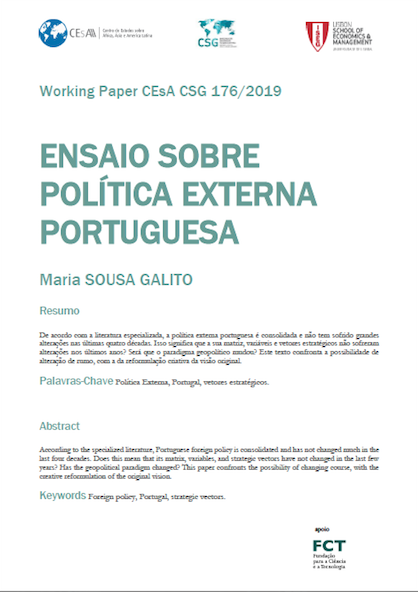
Working Paper 176/2019: Ensaio sobre Política Externa Portuguesa
Abstract:
In general, Portuguese foreign policy is “consolidated” and has not undergone “sudden changes of direction”. According to the national government, the founding matrix remains “well present and consolidated” although “denser, richer, broader”. What exactly does this mean? Our strategic vectors of foreign policy used to be three (Europe, Atlantic and Lusophony). Since the 1990s, some authors have admitted adding a complementary strategic pillar to the previous model. Which one? Three hypotheses. First, security, focusing on the international missions of the Portuguese Armed Forces within the framework of NATO (North Atlantic Treaty Organization), the EU (European Union) or the UN (United Nations). Secondly, cooperation, mainly technical and cultural, with Portuguese-speaking countries, but also with third countries. Thirdly, economic diplomacy, with exports, the diversification of the investment portfolio, the opening of the internal market to the world (and not only to the EU). According to specialized literature, Portuguese foreign policy is consolidated and has not undergone major changes in the last four decades. Does this mean that its matrix, variables and strategic vectors have not changed in recent years? Has the geopolitical paradigm changed? Ensaio sobre Política Externa Portuguesa confronts the possibility of a change of course, with that of the creative reformulation of the original vision.
Quotation:
Galito, Maria Sousa (2019). “Ensaio sobre política externa portuguesa”. Instituto Superior de Economia e Gestão – CEsA/ CSG – Documentos de Trabalho nº 176/2019.
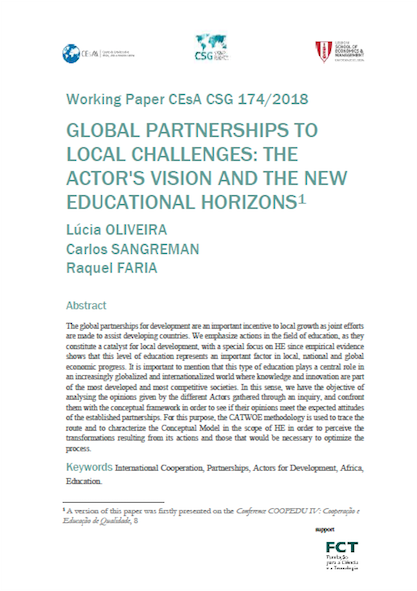
Working Paper 174/2018: Global Partnerships to Local Challenges: The actor’s vision and the new educational horizons
Abstract:
The global partnerships for development are an important incentive to local growth as joint efforts are made to assist developing countries. In Global Partnerships to Local Challenges: The actor’s vision and the new educational horizons we emphasize actions in the field of education, as they constitute a catalyst for local development, with a special focus on HE since empirical evidence shows that this level of education represents an important factor in local, national and global economic progress. It is important to mention that this type of education plays a central role in an increasingly globalized and internationalized world where knowledge and innovation are part of the most developed and most competitive societies. In this sense, we have the objective of analysing the opinions given by the different Actors gathered through an inquiry, and confront them with the conceptual framework in order to see if their opinions meet the expected attitudes of the established partnerships. For this purpose, the CATWOE methodology is used to trace the route and to characterize the Conceptual Model in the scope of HE in order to perceive the transformations resulting from its actions and those that would be necessary to optimize the process.
Quotation:
Oliveira, Lúcia, Carlos Sangreman e Raquel Faria (2018). “Global partnerships to local challenges: the actor’s vision and the new educational horizons”. Instituto Superior de Economia e Gestão – CEsA/ CSG Documentos de Trabalho nº 174/2018.





